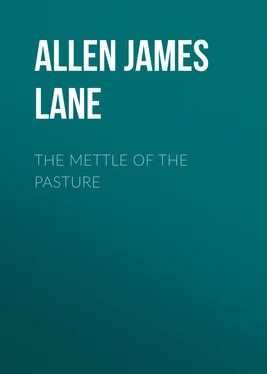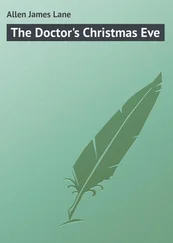James Allen - The Mettle of the Pasture
Здесь есть возможность читать онлайн «James Allen - The Mettle of the Pasture» — ознакомительный отрывок электронной книги совершенно бесплатно, а после прочтения отрывка купить полную версию. В некоторых случаях можно слушать аудио, скачать через торрент в формате fb2 и присутствует краткое содержание. Жанр: foreign_prose, foreign_antique, на английском языке. Описание произведения, (предисловие) а так же отзывы посетителей доступны на портале библиотеки ЛибКат.
- Название:The Mettle of the Pasture
- Автор:
- Жанр:
- Год:неизвестен
- ISBN:нет данных
- Рейтинг книги:4 / 5. Голосов: 1
-
Избранное:Добавить в избранное
- Отзывы:
-
Ваша оценка:
- 80
- 1
- 2
- 3
- 4
- 5
The Mettle of the Pasture: краткое содержание, описание и аннотация
Предлагаем к чтению аннотацию, описание, краткое содержание или предисловие (зависит от того, что написал сам автор книги «The Mettle of the Pasture»). Если вы не нашли необходимую информацию о книге — напишите в комментариях, мы постараемся отыскать её.
The Mettle of the Pasture — читать онлайн ознакомительный отрывок
Ниже представлен текст книги, разбитый по страницам. Система сохранения места последней прочитанной страницы, позволяет с удобством читать онлайн бесплатно книгу «The Mettle of the Pasture», без необходимости каждый раз заново искать на чём Вы остановились. Поставьте закладку, и сможете в любой момент перейти на страницу, на которой закончили чтение.
Интервал:
Закладка:
Her next step must be to talk at once with the other person vitally interested—Rowan's mother. She felt no especial admiration for that grave, earnest, and rather sombre lady; but neither did she feel admiration for her sterling knife and fork: still she made them serviceable for the ulterior ends of being.
Her plan then embraced a visit to Mrs. Meredith in the morning with the view of discovering whether she was aware of the estrangement, and if aware whether she would in any unintentional way throw light upon the cause of it. Moreover—and this was kept clearly in view—there would be the chance of meeting Rowan himself, whom she also determined to see as soon as possible: she might find him at home, or she might encounter him on the road or riding over his farm. But this visit must be made without Isabel's knowledge. It must further be made to appear incidental to Mrs. Meredith herself–or to Rowan. She arranged therefore with that tortuous and superfluous calculation of which hypocrisy is such a master—and mistress—that she would at breakfast, in Isabel's presence, order the carriage, and announce her intention of going out to the farm of Ambrose Webb. Ambrose Webb was a close neighbor of the Merediths. He owned a small estate, most of which was good grass-land that was usually rented for pasture. She had for years kept her cows there when dry. This arrangement furnished her the opportunity for more trips to the farm than interest in her dairy warranted; it made her Mrs. Meredith's most frequent incidental visitor.
Having thus determined upon her immediate course for the prompt unravelling of this mysterious matter, she dismissed it from her mind, passed into her bedroom and was soon asleep: a smile played over the sweet old face.
The Judge walked slowly across the town in the moonlight.
It was his rule to get home to his rooms by ten o'clock; and people living on the several streets leading that way were used to hearing him come tapping along before that hour. If they sat in their doorways and the night was dark, they gave him a pleasant greeting through the darkness; if there was a moon or if he could be seen under a lamp post, they added smiles. No one loved him supremely, but every one liked him a little—on the whole, a stable state for a man. For his part he accosted every one that he could see in a bright cheery way and with a quick inquiring glance as though every heart had its trouble and needed just a little kindness. He was reasonably sure that the old had their troubles already and that the children would have theirs some day; so that it was merely the difference between sympathizing with the present and sympathizing with the future. As he careened along night after night, then, friendly little gusts of salutation blew the desolate drifting figure over the homeward course.
His rooms were near the heart of the town, In a shady street well filled with law offices: these were of red brick with green shutters—green when not white with dust. The fire department was in the same block, though he himself did not need to be safeguarded from conflagrations: the fires which had always troubled him could not have been reached with ladder and hose. There were two or three livery stables also, the chairs of which he patronized liberally, but not the vehicles. And there was a grocery, where he sometimes bought crystallized citron and Brazil nuts, a curious kind of condiment of his own devising: a pound of citron to a pound of nuts, if all were sound. He used to keep little brown paper bags of these locked in his drawer with legal papers and munched them sometimes while preparing murder cases.
At the upper corner of the block, opposite each other, were a saloon and the jail, two establishments which contributed little to each other's support, though well inclined to do so. The law offices seemed of old to have started in a compact procession for the jail, but at a certain point to have paused with the understanding that none should seek undue advantage by greater proximity. Issuing from this street at one end and turning to the left, you came to the courthouse—the bar of chancery; issuing from it at the other end and turning to the right, you came to the hotel—the bar of corn. The lawyers were usually solicitors at large and impartial practitioners at each bar. In the court room they sometimes tried to prove an alibi for their clients; at the hotel they often succeeded in proving one for themselves.
These law offices were raised a foot or two above the level of the street. The front rooms could be used for clients who were so important that they should be seen; the back rooms were for such as brought business, but not necessarily fame. Driving through this street, the wives of the lawyers could lean forward in their carriages and if their husbands were busy, they could smile and bow; if their husbands were idle, they could look straight ahead.
He passed under the shadow of the old court-house where in his prime he had fought his legal battles against the commonwealth. He had been a great lawyer and he knew it (if he had married he might have been Chief Justice). Then he turned the corner and entered the street of jurisprudence and the gaol. About midway he reached the staircase opening from the sidewalk; to his rooms above.
He was not poor and he could have lived richly had he wished. But when a man does not marry there are so many other things that he never espouses; and he was not wedded to luxury. As he lighted the chandelier over the centre-table in his sitting room, the light revealed an establishment every article of which, if it had no virtues, at least possessed habits: certainly everything had its own way. He put his hat and cane on the table, not caring to go back to the hatrack in his little hall, and seated himself in his olive morocco chair. As he did so, everything in the room—the chairs, the curtains, the rugs, the card-table, the punch-bowl, the other walking-sticks, and the rubbers and umbrellas–seemed to say in an affectionate chorus: "Well, now that you are in safe for the night, we feel relieved. So good night and pleasant dreams to you, for we are going to sleep;" and to sleep they went.
The gas alone flared up and said, "I'll stay up with him."
He drew out and wiped his glasses and reached for the local Sunday paper, his Sunday evening Bible. He had read it in the morning, but he always gleaned at night: he met so many of his friends by reading their advertisements. But to-night he spread it across his knees and turning to the table lifted the top of a box of cigars, an orderly responsive family; the paper slipped to the floor and lay forgotten behind his heels.
He leaned back in the chair with his cigar in his mouth and his eyes directed toward the opposite wall, where in an oval frame hung the life-size portrait of an old bulldog. The eyes were blue and watery and as full of suffering as a seats; from the extremity of the lower jaw a tooth stood up like a shoemaker's peg; and over the entire face was stamped the majesty, the patience, and the manly woes of a nature that had lived deeply and too long. The Judge's eyes rested on this comrade face.
The events of the day had left him troubled. Any sermon on the prodigal always touches men; even if it does not prick their memories, it can always stir their imaginations. Whenever he heard one, his mind went back to the years when she who afterwards became Rowan's mother had cast him off, so settling life for him. For after that experience he had put away the thought of marriage. "To be so treated once is enough," he had said sternly and proudly. True, in after years she had come back to him as far as friendship could bring her back, since she was then the wife of another; but every year of knowing her thus had only served to deepen the sense of his loss. He had long since fallen into the habit of thinking this over of Sunday evenings before going to bed, and as the end of life closed in upon him, he dwelt upon it more and more.
Читать дальшеИнтервал:
Закладка:
Похожие книги на «The Mettle of the Pasture»
Представляем Вашему вниманию похожие книги на «The Mettle of the Pasture» списком для выбора. Мы отобрали схожую по названию и смыслу литературу в надежде предоставить читателям больше вариантов отыскать новые, интересные, ещё непрочитанные произведения.
Обсуждение, отзывы о книге «The Mettle of the Pasture» и просто собственные мнения читателей. Оставьте ваши комментарии, напишите, что Вы думаете о произведении, его смысле или главных героях. Укажите что конкретно понравилось, а что нет, и почему Вы так считаете.












